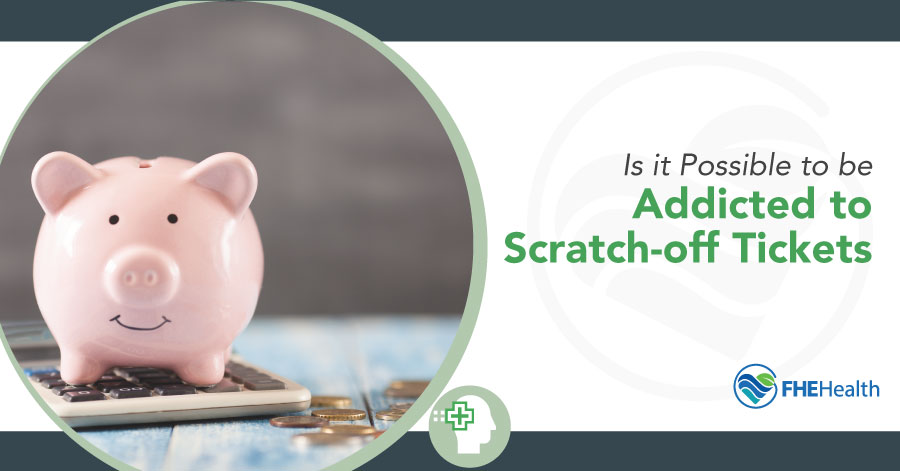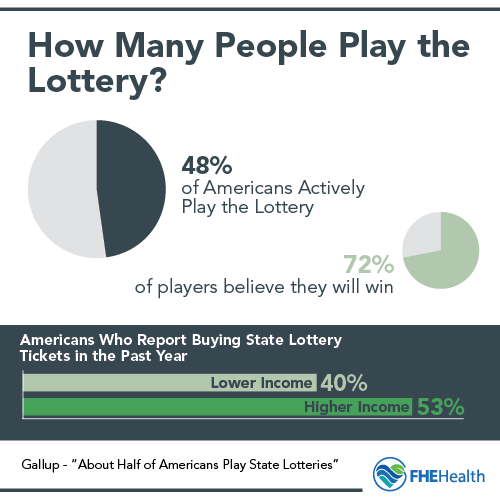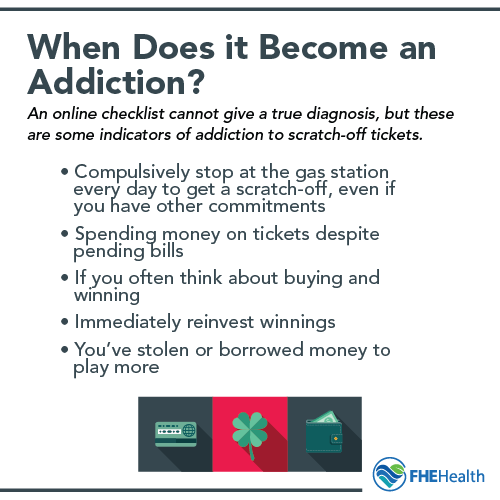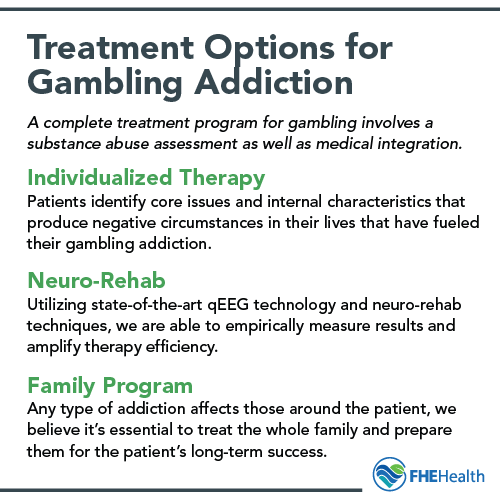
|
|
Updated July 18, 2023
Do you find yourself pinning your hopes and dreams on the lottery? Perhaps you visit the gas station every couple of days, unable to resist the thought that maybe this time you’ll win something big and improve your life. You may wonder, “I am addicted to scratch-offs. How can that be?”
Lottery addiction is a real issue. Many people think of gambling addiction as something that occurs in a casino or at a poker game. Yet, scratch-off tickets are an ongoing threat to many who have a higher risk of developing an addiction. The figures for scratch-off tickets aren’t readily available. However, according to the North American Association of State and Provincial Lotteries, Americans spent $73.5 billion on lottery tickets in 2016 and over $6 billion more on electronic lottery games, as CNN reports.
How Many People Buy Lottery Tickets?
 When the regional or state lottery organizations have a record-breaking jackpot, rates of use climb. In these situations, the odds of winning are incredibly low, even as low as 1 in 292 million if you purchased a single ticket to the Powerball jackpot, according to one Motley Fool report from 2014. To put that into perspective, your odds of being struck and killed by lightning are 1 in 10 million.
When the regional or state lottery organizations have a record-breaking jackpot, rates of use climb. In these situations, the odds of winning are incredibly low, even as low as 1 in 292 million if you purchased a single ticket to the Powerball jackpot, according to one Motley Fool report from 2014. To put that into perspective, your odds of being struck and killed by lightning are 1 in 10 million.
In 2018, Bloomberg discussed how lotteries are doing damage to Americans with the lowest income. The lowest-income homes in the United States are those that tend to spend the most on these tickets. On average, this amounts to $412 each year spent on lottery tickets in these homes, compared to just $105 per year in homes earning the highest incomes. This report also tells us a bit more about who is buying. Specifically, 3 in 10 Americans in these homes are playing the lottery every week as a routine investment. For those who earn more, this figure drops to 2 in 10 people.
Are these individuals simply optimistic that they can win it big and walk away from their low-income lives? It could be, but it could also be a lottery addiction.
What’s the Difference Between Occasional Purchases and Addiction?
Do you really need scratch-off addiction help if your sole goal is to improve your quality of life on a $1 ticket? The answer may be no unless you have some of the symptoms of a lottery addiction such as these:
- You feel you need to stop at the gas station every day to get a scratch-off, even if you are late getting home or have other tasks that seem more important.
- You are buying lottery tickets even though you are behind on bills or need to use the cash for something else.
- You think about, plan for and even pray for lottery winnings.
- You hide your addiction from your family and friends, often getting rid of the scratch-offs before anyone sees them.
- If you win something from the tickets, you immediately reinvest the funds into more tickets, never really walking away with money in your hand.
- You feel anxious, overwhelmed and even angry if you can’t play the lottery.
- You’ve stolen money or borrowed funds to play the lottery.
The biggest difference in occasionally buying tickets and habitually doing so is frequency. It’s okay to buy them if you want to, but doing so on a routine basis can lead to addiction. Addiction occurs when a person cannot avoid the purchase of scratch-off tickets. It is something they think about and plan for every day or as often as they can.
Is Scratch-Off and Lottery Use the Same as Gambling Addiction?
 Compulsive gambling is a type of emotional illness, a condition in which you cannot control your desire to gamble. In some people, scratch-off and lottery use become the same form of addiction. If you have a drawer full of lottery tickets, have spent too much money on them and still want to invest more, you may have a form of gambling addiction.
Compulsive gambling is a type of emotional illness, a condition in which you cannot control your desire to gamble. In some people, scratch-off and lottery use become the same form of addiction. If you have a drawer full of lottery tickets, have spent too much money on them and still want to invest more, you may have a form of gambling addiction.
The Diagnostic and Statistical Manual of Mental Disorders from the American Psychiatric Association defines this type of addiction as including:
- A need to gamble in increasing amounts to get the same level of satisfaction from the process
- Unsuccessful attempts to control or stop gambling or buying lottery tickets
- Preoccupation with gambling, watching for lottery numbers or purchasing scratch-off tickets in high amounts or very frequently
- Gambling when stressed, anxious or depressed
- Lying to hide the purchases or the extent of the investment in scratch-off pieces
- Chasing losses with more investments the next day, especially when done routinely
- Seeks out money from other people to gambling and buy lottery tickets with
- Jeopardizes relationships due to investments in gambling activities
Lottery Vs. Scratch-off
Since lottery gambling addiction is real, does that mean buying scratch-off tickets compulsively is also? Among the examples of lottery addictions, experts say that the form doesn’t matter as much as the compulsiveness in lottery vs. scratch-off. When any behavior becomes so compulsive that the person cannot stop, it can fall into the addiction category.
Is Buying Scratch-off Tickets More Addictive?
Could it be that scratch-off tickets are inherently more addictive than other lottery addictions? The research is hard to find on this question. Some reasons for the appeal of this form of lottery gambling might be:
- Its low cost
- The allure of a potentially large jackpot
- Its convenient availability
- The cheap entertainment/way to pass the time
- Instant gratification
- The instant gratification and immediate payout
- Its heavy advertising
Marketing for lottery vs. scratch-off is clever, catchy, and memorable. For example, some TV and radio ads in California carry the tagline, “You can’t win if you don’t play.” Even though the odds of winning the top jackpot are incredibly high, that doesn’t deter people from playing. They don’t want to miss out on becoming the next jackpot millionaire.
How People Become Addicted to Buying Scratch-Off Tickets
The presence of underlying factors can increase the possibility of addiction to scratch-off tickets. These include:
- Genetics: Some individuals may have specific gene forms called “allele variants” that are related to compulsive gambling. These can be inherited and passed through generations, increasing vulnerability to gambling addiction.
- Environmental: Peer pressure to engage in lottery vs. scratch-off gambling, watching lottery commercials, or frequently patronizing stores selling lottery tickets may increase gambling addiction risk.
- Demographics of Age and Gender: Middle-aged or young adults are more likely to be addicted to gambling than other age groups. Gambling addiction may also become a problem for some older adults. As for gender, men are more likely to have a gambling addiction than women. But the trends for both sexes are approaching similarity.
- Increased Brain Chemistry: Someone with increased norepinephrine levels (a stress hormone) may engage in thrill- and pleasure-seeking activity to combat stress. Also, abnormal dopamine and serotonin levels can contribute to the risk of developing a gambling addiction.
- Other Mental Health Conditions: Those with an addiction, like gambling addiction, may also have a co-occurring disorder. These include anxiety, depression, bipolar disorder, or other mental health conditions.
- Scratch-off Ticket Warning Message and Placement: A 2021 study examined the “Play responsibly” warning messages on popular lottery scratch-off tickets. Researchers specifically looked at the warning messages’ content and placement on the scratch-off tickets.
Warning messages on scratch-off lottery tickets were recommended in principles of responsible gaming by the World Lottery Association (WLA) in 2006. The messages are intended to inform consumers about gambling risks to reduce gambling-associated harm. But to do so effectively, consumers must see and understand the messages and recognize them as warnings.
What researchers found in this study may not be surprising. One-third of study participants never turned to the back of the ticket to read the warning messages. Even among those who did, few could recall or identify the messages. And when they were shown the ticket back, they couldn’t point out the messages. Researchers said this suggested they saw the warnings but misunderstood the content.
Recommendations included:
- Increasing warning message visibility by putting them on the ticket front and altering the size and design.
- Clarifying the odds so consumers can easily understand their chances of winning particular prizes.
- Examining literature on warning messages to find ones that can inform consumers about lottery gambling addiction risks.
- Expanding consumer information beyond the “Play responsibly” message to better educate them about potential harm.
Signs You May Need Help for Self-Control Addictions
Scratch-off addiction help is necessary for many people, most of whom have no idea they need it. Those who have this form of addiction may have other self-control-related addictions as well. For example, some people move addictive behaviors over various things to achieve the same sense of satisfaction or pleasure from the activity. This may include addictions to food, sex or pornography or substance abuse.
What Treatment Options Are Available to You?
 When you are staring at a stack of scratch-off lottery tickets and wondering how you got to this place, take a deep breath and realize there is a help. If you are addicted to scratchers, your first step is to admit there’s a problem. From there, you can begin to seek treatment, including through programs at FHE Health.
When you are staring at a stack of scratch-off lottery tickets and wondering how you got to this place, take a deep breath and realize there is a help. If you are addicted to scratchers, your first step is to admit there’s a problem. From there, you can begin to seek treatment, including through programs at FHE Health.
Support groups are one form of treatment that provides a positive, understanding environment where you can speak openly and receive support as you need it. Gambling-related support groups may have others who have the same type of addiction. You can share how you feel and what you experience when gambling.
There are situations where men and women benefit from therapy for gambling addiction. If your addiction to scratch-off tickets interferes with your day-to-day life or with relationships, seeking individual attention from a therapist can be necessary. Your therapist will use cognitive behavioral therapy and other addiction treatments to help you understand what is happening and why. Over time, you can tackle this addiction any other self-control or impulse-related addiction you may be predisposed to.
Seek Help From FHE Health for Lottery Addiction
Addiction impacts the lives of many, even in the form of lottery tickets. If you believe you have an addiction or just want help, call our compassionate team now at (833) 596-3502 to discuss your options. Our professionals are available 24-hours a day to answer your questions.






